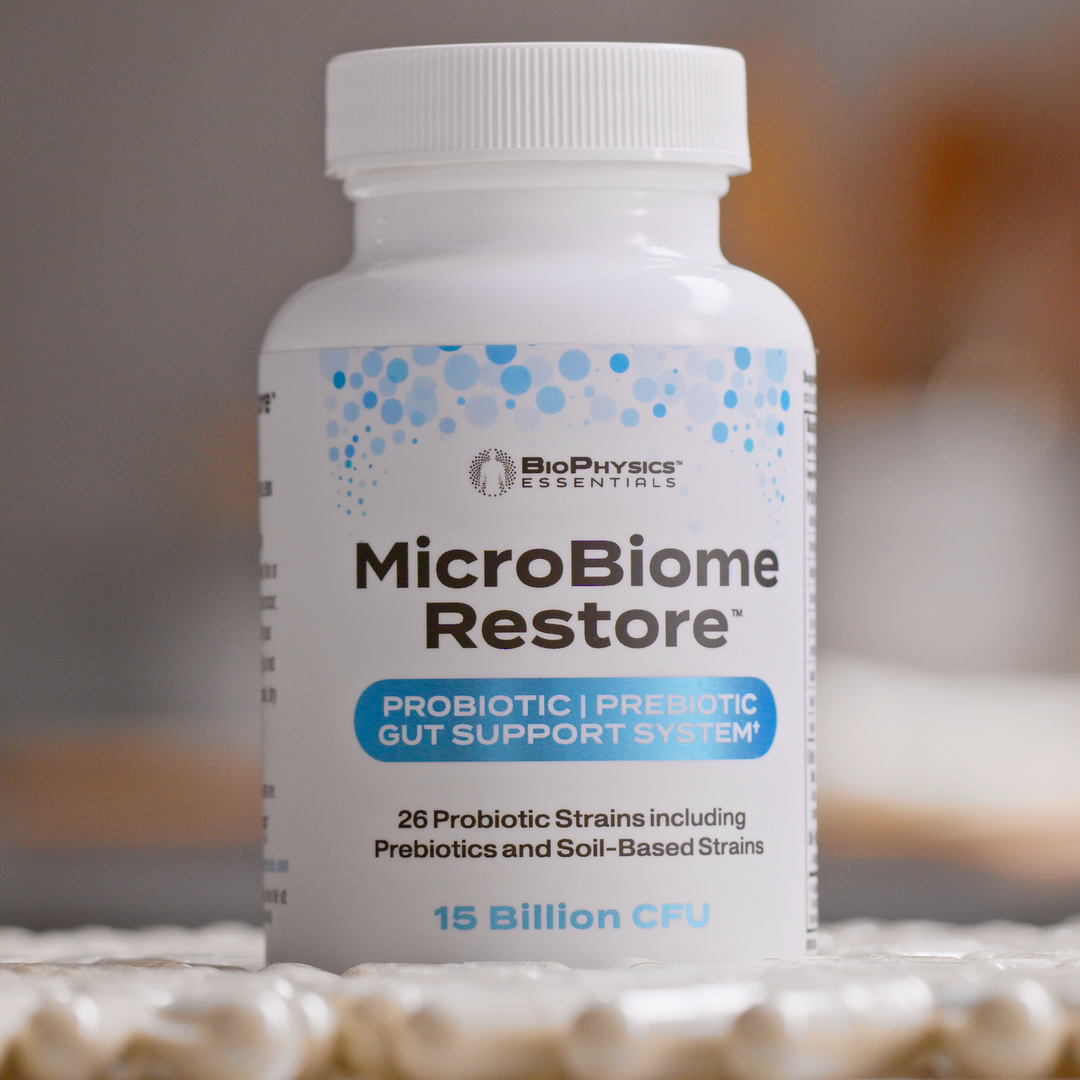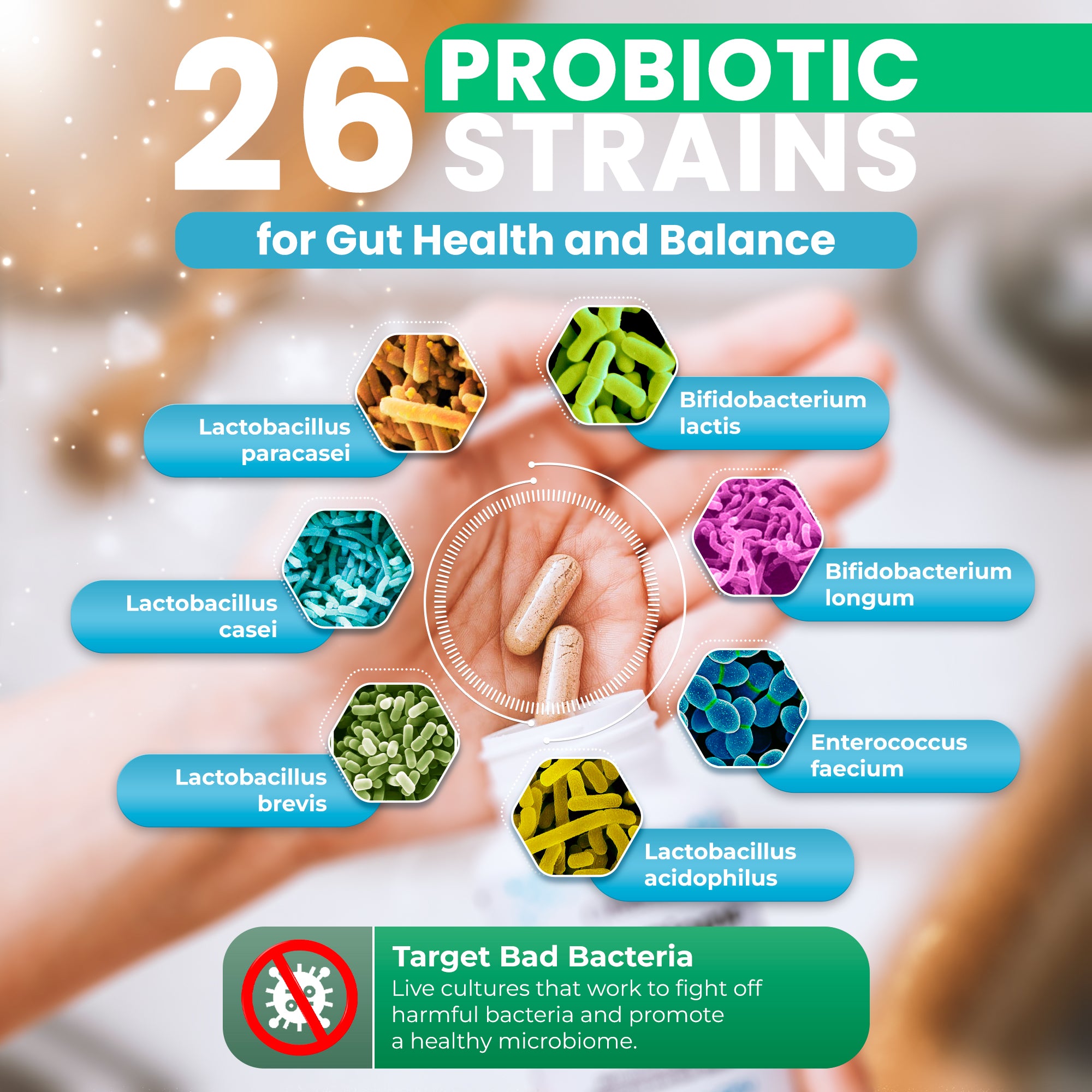Unlocking the Potential of Bifidobacterium lactis Benefits for Gut Health
Bifidobacterium lactis (B. lactis), also known as Bifidobacterium animalis subsp. lactis, represents one of the most extensively studied probiotic species in the scientific literature. This remarkable microorganism has demonstrated significant potential in supporting digestive health, enhancing immune function, and contributing to overall wellness. From metabolic health to cognitive function, emerging research continues to reveal the diverse benefits of this probiotic powerhouse.
Key Takeaways:
- B. lactis is a clinically researched probiotic that supports gut health, immune function, and metabolic wellness
- Specific strains like HN019 and BB-12 have distinct, well-documented health benefits backed by clinical trials
- Research suggests potential benefits for digestive disorders, weight management, cardiovascular health, and mental wellbeing
- B. lactis demonstrates effectiveness in both live and heat-killed forms, expanding its therapeutic applications
- Multi-strain formulas like MicroBiome Restore leverage B. lactis alongside other beneficial bacteria for comprehensive gut support
- Natural dietary sources include yogurt, kefir, and fermented dairy products containing active cultures
What is Bifidobacterium lactis?
B. lactis is a gram-positive, anaerobic bacterium that naturally colonizes the human gastrointestinal tract. As a member of the Bifidobacterium genus, it plays a fundamental role in maintaining the delicate balance of the gut microbiome [1]. Probiotics like B. lactis are essential for supporting digestive function, nutrient absorption, and immune system modulation.
What distinguishes B. lactis from other probiotic species is its exceptional resilience. Research demonstrates that B. lactis possesses remarkable acid and bile tolerance, allowing it to survive passage through the harsh acidic environment of the stomach and successfully colonize the intestines [2]. This survival capability makes it particularly effective as a probiotic supplement, ensuring that viable bacteria reach the colon where they exert their beneficial effects.
B. lactis produces important metabolites, including short-chain fatty acids (SCFAs) such as acetate, propionate, and butyrate. These compounds serve as primary fuel sources for colonocytes (intestinal cells) and play crucial roles in maintaining gut barrier integrity, reducing inflammation, and supporting overall intestinal health [3].
B. lactis contributes to the acetate pool that fuels butyrate production through bacterial cross-feeding—see our complete guide on short-chain fatty acids to understand this process.
Understanding Different B. lactis Strains
Not all B. lactis strains are created equal. Strain-specific effects are a critical consideration in probiotic research, as different strains within the same species can demonstrate distinct health benefits. The most extensively studied B. lactis strains include:
- B. lactis HN019: Extensively researched for immune function enhancement, bowel regularity, and metabolic health [4, 5]
- B. lactis BB-12: The world's most documented Bifidobacterium strain, studied in over 300 scientific publications for digestive health and infant colic [6]
- B. lactis Bl-04: Investigated for immune support and respiratory health benefits [7]
- B. lactis BLa80: Emerging research on sleep quality and gut-brain axis modulation [8] B. lactis BLa80 has been shown to shorten antibiotic-associated diarrhea duration by over 25 hours—see the complete clinical evidence in our probiotics after antibiotics guide.
Immune System Enhancement and Inflammation Modulation
One of the most compelling benefits of B. lactis is its ability to support and strengthen immune function. A landmark study by Gill et al. (2001) demonstrated that supplementation with B. lactis HN019 significantly enhanced immune cell activity in elderly subjects [9]. The research revealed increases in key immune markers including:
Key Immune Benefits of B. lactis HN019
- Enhanced T lymphocyte populations: Supporting cellular immunity and immune system coordination
- Increased natural killer (NK) cell activity: Improving the body's defense against abnormal cells and pathogens
- Elevated phagocytic activity: Helping immune cells more effectively capture and eliminate harmful particles
- Improved tumor-killing capacity: Supporting the body's natural anti-cancer surveillance mechanisms
- Dose-flexible efficacy: Demonstrating benefits at both low and high supplementation doses
- Age-appropriate support: Particularly beneficial for elderly individuals experiencing age-related immune decline
Beyond cellular immunity, B. lactis demonstrates significant anti-inflammatory properties. Studies show that specific strains can reduce pro-inflammatory cytokines such as tumor necrosis factor-alpha (TNF-α) and interleukin-6 (IL-6), which are implicated in chronic inflammatory conditions [10, 11]. This anti-inflammatory action occurs through multiple mechanisms, including modulation of the gut microbiota, strengthening of the intestinal barrier, and direct interaction with immune cells in the gut-associated lymphoid tissue (GALT).
Digestive Health and Gastrointestinal Function
Supporting Bowel Regularity and Constipation Management
Functional constipation affects approximately 14-16% of adults worldwide, significantly impacting quality of life [12]. B. lactis, particularly the HN019 strain, has been investigated for its potential to improve bowel function and reduce constipation symptoms.
Early research suggested promising results. A 2018 double-blind, placebo-controlled study by Ibarra et al. found that 28-day supplementation with B. lactis HN019 improved colonic transit time and gastrointestinal symptoms in adults with functional constipation [13]. Participants reported improvements in bowel movement frequency, stool consistency, and overall digestive comfort.
However, it's important to note that more recent, larger-scale trials have shown mixed results. A 2024 randomized clinical trial published in JAMA Network Open, involving 229 participants across five hospitals in China, found that 8-week supplementation with B. lactis HN019 did not significantly outperform placebo in increasing complete spontaneous bowel movements [14]. This highlights an important principle in probiotic research: effects can vary based on dosage, duration, individual microbiome composition, and study population characteristics.
The current evidence suggests that B. lactis may help some individuals with constipation, particularly when combined with adequate fiber intake and proper hydration. Individual responses to probiotic supplementation can vary considerably, and what works for one person may not be equally effective for another.
Irritable Bowel Syndrome (IBS) and Digestive Discomfort
B. lactis has demonstrated potential benefits for individuals suffering from IBS symptoms, including bloating, abdominal pain, and irregular bowel habits. Research indicates that B. lactis DN-173 010 improved abdominal distension and accelerated gastrointestinal transit in patients with IBS-constipation [15]. The probiotic's ability to modulate gut microbiota composition and enhance SCFA production appears to contribute to symptom relief.
While B. lactis excels at general digestive support, its close relative B. infantis has emerged as the standout strain for IBS symptom management based on meta-analysis findings.
Lactose Intolerance Support
For individuals with lactose intolerance, B. lactis may provide welcome relief. The bacterium produces beta-galactosidase, the enzyme responsible for breaking down lactose into more easily digestible sugars [16]. Clinical trials have demonstrated that B. lactis supplementation can reduce gastrointestinal symptoms associated with lactose consumption, allowing some individuals to better tolerate dairy products.
Metabolic Health and Cardiovascular Benefits
Weight Management and Body Composition
Emerging research suggests that B. lactis may play a role in supporting healthy weight management and metabolic function. Animal studies have demonstrated that both live and heat-killed B. lactis can reduce body fat accumulation, improve lean mass, and enhance energy expenditure [17, 18].
One of B. lactis 420's most notable clinical findings was a 4.5% reduction in body fat mass over six months, likely driven by its ability to strengthen gut barrier integrity — see the full trial data in our probiotics for belly fat research review.
The mechanisms behind these effects appear multifaceted, involving modulation of fat metabolism genes, enhancement of insulin sensitivity, and favorable alterations in gut microbiota composition. While human studies are still emerging, the preliminary evidence suggests potential applications for metabolic health support.
Cholesterol Management and Cardiovascular Risk Reduction
Perhaps one of the most clinically significant metabolic benefits of B. lactis involves its effects on cardiovascular risk factors. A randomized controlled trial by Bernini et al. (2016) investigated B. lactis HN019 supplementation in patients with metabolic syndrome—a cluster of conditions including obesity, hypertension, and dyslipidemia [19].
The results were noteworthy. After 45 days of daily supplementation with fermented milk containing 2.72 × 1010 CFU of B. lactis HN019, participants experienced:
- Significant reduction in body mass index (BMI)
- Decreased total cholesterol levels
- Lower low-density lipoprotein (LDL) cholesterol
- Reduced inflammatory markers (TNF-α and IL-6)
Additional research has confirmed that B. lactis can influence cholesterol metabolism through multiple pathways, including bile salt hydrolysis, modulation of hepatic lipid synthesis, and favorable alterations in gut microbiota composition [20, 21]. These cardiovascular benefits position B. lactis as a potentially valuable adjunct to conventional approaches for managing metabolic syndrome and cardiovascular risk.
Mental Health and the Gut-Brain Axis
Sleep Quality Enhancement
The connection between gut health and sleep quality represents an exciting frontier in probiotic research. A 2025 double-blind, randomized, placebo-controlled study investigated the effects of B. lactis BLa80 supplementation on sleep quality in 106 healthy adults [8].
After 8 weeks of supplementation with 10 billion CFU daily, participants showed improvements in sleep quality as measured by the Pittsburgh Sleep Quality Index (PSQI) and Insomnia Severity Index (ISI). The researchers noted corresponding changes in gut microbiota composition and identified the strain's capacity to produce gamma-aminobutyric acid (GABA), a neurotransmitter that promotes relaxation and sleep.
Cognitive Function and Mood Support
The gut-brain axis—the bidirectional communication pathway between the gastrointestinal tract and the central nervous system—has become a major focus of neuroscience research. B. lactis appears to influence this connection through several mechanisms [22]:
- Production of neurotransmitter precursors and metabolites
- Modulation of inflammatory cytokines that can affect brain function
- Enhancement of gut barrier integrity, reducing systemic inflammation
- Influence on the vagus nerve, which connects the gut to the brain
Clinical trials have demonstrated that multi-species probiotic formulations containing B. lactis can improve cognitive performance and emotional wellbeing in older adults, suggesting potential applications for age-related cognitive decline and mood disorders [23].
Inflammatory Conditions and Specialized Applications
Inflammatory Bowel Disease and Colitis
Recent research has explored B. lactis as a potential therapeutic adjunct for inflammatory bowel conditions. A 2025 study demonstrated that B. lactis V9 significantly reduced colitis symptoms in a murine model, decreasing inflammatory markers and restoring intestinal tissue structure [24]. Another investigation found that B. lactis TCI604 ameliorated inflammation, dysbiosis, and colonic precancerous lesions in an animal model, suggesting potential chemopreventive properties [25].
While these findings are promising, it's important to emphasize that research in human IBD patients remains limited. B. lactis should not be considered a replacement for conventional IBD therapies but may serve as a complementary approach under medical supervision.
Eczema Prevention in Infants
For families with a history of allergic conditions, B. lactis may offer preventive benefits. A double-blind, randomized, placebo-controlled trial by Kim et al. (2010) investigated the effects of a probiotic mixture containing B. lactis (along with B. bifidum and L. acidophilus) on eczema prevention [26].
When pregnant mothers and their infants received the probiotic intervention, babies showed a significantly reduced incidence of eczema during their first year of life. The researchers hypothesized that early probiotic exposure helps balance the developing immune system, reducing the likelihood of allergic hypersensitivity reactions.
This immune-modulating effect during critical developmental windows suggests that B. lactis supplementation during pregnancy and early infancy may have long-lasting benefits for children at high risk of atopic conditions. However, parents should consult with healthcare providers before beginning any supplementation regimen during pregnancy or for infants.
Gut Microbiome Modulation and Microbial Balance
One of the fundamental mechanisms through which B. lactis exerts its health benefits involves favorable modulation of the gut microbiome. Research by Ahmed et al. (2007) demonstrated that B. lactis HN019 supplementation in elderly subjects led to significant increases in beneficial bacteria (Bifidobacteria and Lactobacilli) while decreasing potentially harmful bacteria such as Enterobacteria [27].
This rebalancing effect is particularly important as we age, since the gut microbiota tends to lose diversity and beneficial species over time. The ability of B. lactis to enhance microbial diversity and promote beneficial bacteria populations contributes to improved digestive function, enhanced nutrient absorption, and better overall health outcomes.
Furthermore, B. lactis produces antimicrobial compounds that create an inhospitable environment for pathogenic organisms while supporting the growth of health-promoting bacteria. This competitive exclusion mechanism helps maintain a balanced intestinal ecosystem [28].
MicroBiome Restore: Comprehensive Probiotic Support with B. lactis
For those seeking to incorporate B. lactis into their wellness routine, MicroBiome Restore offers a scientifically formulated multi-strain approach. This comprehensive supplement features B. lactis as part of a synergistic blend of 26 probiotic strains, including soil-based organisms, combined with 9 certified organic prebiotics.
Why Multi-Strain Formulas Matter
While individual probiotic strains like B. lactis offer specific benefits, research increasingly supports the advantages of multi-strain formulations. Different bacterial species and strains work synergistically, each contributing unique metabolic capabilities and health-promoting activities. MicroBiome Restore's comprehensive approach ensures support for multiple aspects of gut health simultaneously.
Key Features of MicroBiome Restore
- 15 Billion CFU per serving: Therapeutic dose targeting optimal efficacy
- 26 diverse probiotic strains: Including B. lactis and complementary species
- 9 certified organic prebiotics: Including Jerusalem Artichoke, Maitake Mushroom, and Norwegian Kelp to nourish probiotic bacteria
- Soil-based organisms: Enhancing probiotic survival and colonization
- Fermented capsule technology: Pullulan capsules that convert to SCFAs, supporting probiotic activity
- Filler-free formula: No cellulose, magnesium stearate, or unnecessary additives
- Shelf-stable formulation: Maintains potency at room temperature without refrigeration
The formula is designed to address multiple dimensions of gut health—from supporting digestion and regularity to enhancing immune function and promoting metabolic wellness. By combining B. lactis with other beneficial strains and prebiotic fibers, MicroBiome Restore creates an optimal environment for a thriving gut microbiome.
Natural Dietary Sources of B. lactis
While probiotic supplements offer concentrated and standardized doses, dietary sources of probiotics provide an excellent complementary approach to gut health support. B. lactis occurs naturally in several fermented foods:
- Yogurt: Look for products specifically listing B. lactis or Bifidobacterium animalis subsp. lactis on the label
- Kefir: This fermented milk beverage often contains multiple Bifidobacterium species including B. lactis
- Fermented dairy products: Some specialty cheeses and cultured dairy products contain B. lactis
- Fortified foods: Certain functional foods are specifically fortified with B. lactis strains
When selecting probiotic foods, check labels for "live and active cultures" and specific strain names. The quantity of viable bacteria can vary significantly between products and even between batches, so quality matters. For those following plant-based diets, some non-dairy yogurts and fermented products may contain B. lactis, though dairy-based sources remain most common.
Safety Considerations and Contraindications
B. lactis demonstrates an excellent safety profile across diverse populations. Clinical trials involving thousands of participants have consistently reported minimal adverse effects [29]. The strain has been granted Generally Recognized as Safe (GRAS) status by regulatory authorities for use in food products and dietary supplements.
General Safety Profile
For most healthy individuals, B. lactis supplementation is well-tolerated. Some people may experience mild, temporary digestive symptoms during the initial days of supplementation, including:
- Mild bloating or gas
- Changes in bowel habits
- Temporary digestive adjustments
These symptoms typically resolve within a few days as the gut microbiome adjusts to the new bacterial populations. Starting with a lower dose and gradually increasing can help minimize initial discomfort.
Special Populations and Precautions
While generally safe, certain individuals should exercise additional caution:
- Immunocompromised individuals: Those with severely weakened immune systems (chemotherapy patients, HIV/AIDS, organ transplant recipients) should consult healthcare providers before taking probiotics
- Critically ill patients: Individuals in intensive care or with serious underlying conditions should seek medical guidance
- Central venous catheter patients: Rare cases of bacteremia have been reported with probiotic use in patients with central lines
- Pregnant and nursing mothers: While research suggests safety, consultation with healthcare providers is recommended
The Future of B. lactis Research
Scientific investigation into B. lactis continues to expand, with emerging research exploring novel applications and deeper mechanistic understanding. Current areas of active investigation include:
Precision Probiotics and Personalized Nutrition
Advances in microbiome sequencing technology are enabling researchers to better understand how individual gut microbiome compositions influence responses to specific probiotic strains. Future applications may include personalized probiotic recommendations based on an individual's unique microbial profile, optimizing B. lactis supplementation for maximum benefit.
Postbiotic Applications
Exciting research demonstrates that heat-killed (non-viable) B. lactis and its metabolic byproducts retain health-promoting properties [30]. This discovery opens possibilities for postbiotic supplements—products containing beneficial bacterial components rather than live organisms—which may offer advantages for stability, safety in immunocompromised individuals, and specific therapeutic applications.
Combination Therapies
Researchers are investigating synergistic combinations of B. lactis with other therapeutic interventions, including:
- Pharmaceutical medications for enhanced efficacy and reduced side effects
- Specialized prebiotic fibers for targeted microbiome modulation
- Other probiotic strains for complementary health benefits
- Functional foods and bioactive compounds
Expanding Clinical Applications
Ongoing trials are exploring B. lactis for additional health conditions, including:
- Bone and muscle health in aging populations
- Respiratory infections and immune resilience
- Neurodegenerative diseases and cognitive decline
- Autoimmune conditions and immune modulation
- Cancer prevention and treatment support
B. lactis also plays a significant role in supporting bone metabolism during menopause, with clinical trials showing improved bone health markers when combined with calcium and vitamin D supplementation in postmenopausal women.
As research methodologies become more sophisticated and our understanding of the microbiome deepens, B. lactis will likely reveal additional therapeutic potential across diverse aspects of human health.
Conclusion
Bifidobacterium lactis stands as one of the most extensively researched and clinically validated probiotic species available today. From its foundational benefits for digestive health and immune function to emerging applications in metabolic wellness, mental health, and disease prevention, B. lactis demonstrates remarkable versatility.
The strain-specific nature of probiotic benefits underscores the importance of selecting well-researched strains like HN019 and BB-12, which have substantial clinical evidence supporting their efficacy. Whether obtained through fermented foods or high-quality supplements like MicroBiome Restore, incorporating B. lactis into a comprehensive wellness strategy offers a scientifically supported approach to optimizing gut health and overall wellbeing.
As with any health intervention, individual responses vary. What works exceptionally well for one person may produce modest results in another, reflecting the personalized nature of the human microbiome. Consistency, patience, and attention to overall lifestyle factors—including diet, stress management, sleep, and physical activity—create the optimal foundation for probiotic benefits to manifest.
The future of B. lactis research promises even deeper insights into this remarkable microorganism's potential. As science continues to unravel the complex relationships between gut bacteria and human health, B. lactis will undoubtedly remain at the forefront of probiotic innovation and therapeutic application.
References
- Lugli, G.A., Argentini, C., Tarracchini, C., Mancabelli, L., Viappiani, A., Anzalone, R., Angelini, L., Alessandri, G., Longhi, G., Bianchi, M.G., Taurino, G., Bussolati, O., Milani, C., Turroni, F., & Ventura, M. (2024). Characterization of a Bifidobacterium animalis subsp. lactis reference strain based on ecology and transcriptomics. Applied and Environmental Microbiology, 90(10), e01080-24. https://doi.org/10.1128/aem.01080-24
- Collins, F.W.J., Vera-Jiménez, N.I., & Wellejus, A. (2025). Understanding the probiotic health benefits of Bifidobacterium animalis subsp. lactis, BB-12™. Frontiers in Microbiology, 16, 1605044. https://doi.org/10.3389/fmicb.2025.1605044
- Corte-Lista, A., et al. (2024). Short-chain fatty acid production and gut health benefits of Bifidobacterium lactis. Nutritional Science Reviews.
- D'ambrosio, S., Dabous, A., Sadiq, S., Casillo, A., Schiraldi, C., Cassese, E., Bedini, E., Corsaro, M.M., & Cimini, D. (2024). Bifidobacterium animalis subsp. lactis HN019 live probiotics and postbiotics: production strategies and bioactivity evaluation for potential therapeutic properties. Frontiers in Bioengineering and Biotechnology, 12, 1379574. https://doi.org/10.3389/fbioe.2024.1379574
- Cheng, J., Laitila, A., & Ouwehand, A.C. (2021). Bifidobacterium animalis subsp. lactis HN019 Effects on Gut Health: A Review. Frontiers in Nutrition, 8, 790561. https://doi.org/10.3389/fnut.2021.790561
- Jungersen, M., Wind, A., Johansen, E., Christensen, J.E., Stuer-Lauridsen, B., & Eskesen, D. (2014). The Science behind the Probiotic Strain Bifidobacterium animalis subsp. lactis BB-12®. Microorganisms, 2(2), 92-110. https://doi.org/10.3390/microorganisms2020092
- Lehtoranta, L., Pitkäranta, A., & Korpela, R. (2014). Probiotics in respiratory virus infections. European Journal of Clinical Microbiology & Infectious Diseases, 33(8), 1289-1302.
- Liu, Y., Chen, Y., Zhang, Q., et al. (2025). A double blinded randomized placebo trial of Bifidobacterium animalis subsp. lactis BLa80 on sleep quality and gut microbiota in healthy adults. Scientific Reports, 15, 11095. https://doi.org/10.1038/s41598-025-95208-2
- Gill, H.S., Rutherfurd, K.J., Cross, M.L., & Gopal, P.K. (2001). Enhancement of immunity in the elderly by dietary supplementation with the probiotic Bifidobacterium lactis HN019. The American Journal of Clinical Nutrition, 74(6), 833-839. https://doi.org/10.1093/ajcn/74.6.833
- Duan, X., Wu, R., Li, J., Li, Z., Liu, Y., Chen, P., & Wang, B. (2025). Studies on the alleviating effect of Bifidobacterium lactis V9 on dextran sodium sulfate-induced colitis in mice. Frontiers in Medicine, 12, 1496023. https://doi.org/10.3389/fmed.2025.1496023
- Bernini, L.J., Simão, A.N.C., Alfieri, D.F., Lozovoy, M.A.B., Mari, N.L., de Souza, C.H.B., Dichi, I., & Costa, G.N. (2016). Beneficial effects of Bifidobacterium lactis on lipid profile and cytokines in patients with metabolic syndrome: A randomized trial. Effects of probiotics on metabolic syndrome. Nutrition, 32(6), 716-719. https://doi.org/10.1016/j.nut.2015.11.001
- Barberio, B., Judge, C., Savarino, E.V., & Ford, A.C. (2021). Global Prevalence of Functional Constipation According to the Rome Criteria: A Systematic Review and Meta-Analysis. Lancet Gastroenterology & Hepatology, 6(8), 638-648.
- Ibarra, A., Latreille-Barbier, M., Donazzolo, Y., Pelletier, X., & Ouwehand, A.C. (2018). Effects of 28-day Bifidobacterium animalis subsp. lactis HN019 supplementation on colonic transit time and gastrointestinal symptoms in adults with functional constipation: A double-blind, randomized, placebo-controlled, and dose-ranging trial. Gut Microbes, 9(3), 236-251. https://doi.org/10.1080/19490976.2017.1412908
- Cheng, J., Gao, C., Ala-Jaakkola, R., Forssten, S.D., Saarinen, M., Hibberd, A., Ouwehand, A.C., Ibarra, A., Li, D., Nordlund, A., Wang, Y., Shen, X., Peng, H., Wan, X., & Meng, X. (2024). Eight-Week Supplementation With Bifidobacterium lactis HN019 and Functional Constipation: A Randomized Clinical Trial. JAMA Network Open, 7(10), e2439957. https://doi.org/10.1001/jamanetworkopen.2024.39957
- Whorwell, P.J., Altringer, L., Morel, J., Bond, Y., Charbonneau, D., O'Mahony, L., Kiely, B., Shanahan, F., & Quigley, E.M. (2006). Clinical trial: the efficacy of a fermented milk product containing Bifidobacterium lactis DN-173 010 on abdominal distension and gastrointestinal transit in irritable bowel syndrome with constipation. Alimentary Pharmacology & Therapeutics, 24(1), 29-37.
- He, T., Priebe, M.G., Zhong, Y., Huang, C., Harmsen, H.J.M., Raangs, G.C., Antoine, J.M., Welling, G.W., & Vonk, R.J. (2008). Effects of yogurt and bifidobacteria supplementation on the colonic microbiota in lactose-intolerant subjects. Journal of Applied Microbiology, 104(2), 595-604.
- Caimari, A., del Bas, J.M., Boqué, N., Crescenti, A., Puiggròs, F., Chenoll, E., Martorell, P., Genovés, S., Ramón, D., & Arola, L. (2017). Heat-killed Bifidobacterium animalis subsp. lactis CECT 8145 increases lean mass and ameliorates metabolic syndrome in cafeteria-fed obese rats. Journal of Functional Foods, 38, 251-263. https://doi.org/10.1016/j.jff.2017.09.029
- Wang, J., Tang, H., Zhang, C., Zhao, Y., Derrien, M., Rocher, E., van-Hylckama Vlieg, J.E., Strissel, K., Zhao, L., Obin, M., & Shen, J. (2015). Modulation of gut microbiota during probiotic-mediated attenuation of metabolic syndrome in high fat diet-fed mice. The ISME Journal, 9(1), 1-15.
- Bernini, L.J., Simão, A.N.C., Alfieri, D.F., Lozovoy, M.A.B., Mari, N.L., de Souza, C.H.B., Dichi, I., & Costa, G.N. (2016). Beneficial effects of Bifidobacterium lactis on lipid profile and cytokines in patients with metabolic syndrome: A randomized trial. Nutrition, 32(6), 716-719.
- Tang, J., Wei, Y., Pi, C., Zheng, W., Zuo, Y., Shi, P., Chen, J., Xiong, L., Chen, T., Liu, H., Zhao, Q., Yin, S., Ren, W., Cao, P., Zeng, N., & Zhao, L. (2023). The therapeutic value of bifidobacteria in cardiovascular disease. npj Biofilms and Microbiomes, 9, 88. https://doi.org/10.1038/s41522-023-00448-7
- Zanotti, I., Turroni, F., Piemontese, A., Mancabelli, L., Milani, C., Viappiani, A., Prevedini, G., Sánchez, B., Margolles, A., Elviri, L., Franco, B., van Sinderen, D., & Ventura, M. (2015). Evidence for cholesterol-lowering activity by Bifidobacterium bifidum PRL2010 through gut microbiota modulation. Applied Microbiology and Biotechnology, 99(16), 6813-6829.
- Foster, J.A., & McVey Neufeld, K.A. (2013). Gut-brain axis: how the microbiome influences anxiety and depression. Trends in Neurosciences, 36(5), 305-312.
- Kato-Kataoka, A., Nishida, K., Takada, M., Kawai, M., Kikuchi-Hayakawa, H., Suda, K., Ishikawa, H., Gondo, Y., Shimizu, K., Matsuki, T., Kushiro, A., Hoshi, R., Watanabe, O., Igarashi, T., Miyazaki, K., Kuwano, Y., & Rokutan, K. (2016). Fermented milk containing Lactobacillus casei strain Shirota preserves the diversity of the gut microbiota and relieves abdominal dysfunction in healthy medical students exposed to academic stress. Applied and Environmental Microbiology, 82(12), 3649-3658.
- Duan, X., Wu, R., Li, J., Li, Z., Liu, Y., Chen, P., & Wang, B. (2025). Studies on the alleviating effect of Bifidobacterium lactis V9 on dextran sodium sulfate-induced colitis in mice. Frontiers in Medicine, 12, 1496023.
- Chiu, Y.H., & Wu, C.J. (2025). Bifidobacterium lactis ameliorates AOM/DSS-induced inflammation, dysbiosis, and colonic precancerous lesions. Applied Microbiology and Biotechnology, 109(1), 69. https://doi.org/10.1007/s00253-025-13445-x
- Kim, J.Y., Kwon, J.H., Ahn, S.H., Lee, S.I., Han, Y.S., Choi, Y.O., Lee, S.Y., Ahn, K.M., & Ji, G.E. (2010). Effect of probiotic mix (Bifidobacterium bifidum, Bifidobacterium lactis, Lactobacillus acidophilus) in the primary prevention of eczema: A double-blind, randomized, placebo-controlled trial. Pediatric Allergy and Immunology, 21(2), 386-393. https://doi.org/10.1111/j.1399-3038.2009.00958.x
- Ahmed, M., Prasad, J., Gill, H., Stevenson, L., & Gopal, P. (2007). Impact of consumption of different levels of Bifidobacterium lactis HN019 on the intestinal microflora of elderly human subjects. The Journal of Nutrition, Health & Aging, 11(1), 26-31.
- Gopal, P.K., Prasad, J., & Gill, H.S. (2003). Effects of the consumption of Bifidobacterium lactis HN019 (DR10™) and galacto-oligosaccharides on the microflora of the gastrointestinal tract in human subjects. Nutrition Research, 23(10), 1313-1328. https://doi.org/10.1016/S0271-5317(03)00134-9
- Ouwehand, A.C., Salminen, S., & Isolauri, E. (2002). Probiotics: an overview of beneficial effects. Antonie van Leeuwenhoek, 82(1-4), 279-289.
- Vinderola, G., Sanders, M.E., & Salminen, S. (2022). The concept of postbiotics. Foods, 11(8), 1077. https://doi.org/10.3390/foods11081077
About BioPhysics Essentials: We are committed to providing science-backed, high-quality supplements that support optimal health and wellness. Our MicroBiome Restore formula represents our dedication to gut health excellence, combining extensively researched probiotic strains like B. lactis with synergistic prebiotics for comprehensive digestive support.
Learn More:
Last updated: October 2025 | This article reflects the most current scientific research available at the time of publication.











Share and get 15% off!
Simply share this product on one of the following social networks and you will unlock 15% off!